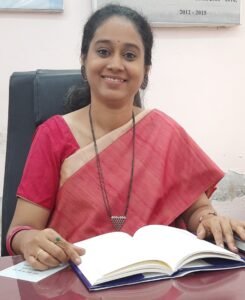Dr. Shakuntala Gawde, Associate Professor and former Head in the Department of Sanskrit at the University of Mumbai, stands as a distinguished figure in the realm of Sanskrit scholarship, seamlessly blending the roles of an accomplished academician, researcher, and educator. With a dedicated tenure spanning over a decade, her profound commitment to the discipline has manifested in a tapestry of accomplishments that extend across teaching, research, and collaborative projects.
Dr. Gawde’s academic journey began with stellar achievements, marking her as the first ranker and gold medallist in both B.A. (Sanskrit) and M.A. (Sanskrit-Vedanta specialisation). Her intellectual curiosity led her to pursue an M.Phil in Sanskrit with a specialization in Eastern and Western Philosophy, delving into the intricate theme of ‘Eschatology in Upaniṣads.’ Subsequently, she further enriched her academic repertoire by obtaining a PhD in Sanskrit, exploring ‘Eschatology in Vedic Literature compared with Western Philosophy.’ These foundational pursuits laid the groundwork for her expansive engagement with the philosophical and literary traditions of Sanskrit.
Dr. Gawde’s areas of interest span across Vedānta, Hinduism, Religious Studies, Purāṇa Studies, and Aesthetics, reflecting a comprehensive and interdisciplinary approach to Sanskrit scholarship. Her extensive body of work includes research papers on ‘Comparative Philosophy,’ disseminated through reputable journals and edited volumes, contributing significantly to the discourse on cross-cultural philosophical investigations.
A notable facet of Dr. Gawde’s academic journey is her active participation in national and international seminars, including distinguished platforms such as the World Sanskrit Conference in 2015 and 2023. As a resource person, she has lent her expertise to courses on Upaniṣads, Leadership Science, and Aesthetics, illustrating her commitment to disseminating knowledge beyond traditional academic boundaries. She was the coordinator for the section of World religion and Philosophy (Jagatika dharma ani Tattvadnyana) for Marathi Vishwakosha (2016-Feb 2022).
The global recognition of Dr. Gawde’s scholarship is evident in her invitation as a ‘Visiting Fellow’ by Kelaniya University, Sri Lanka, in 2017, marking a testament to her international influence in the field.
Her extensive publications, including a recently published book titled ‘Narrative Analysis of Bhagavata Purana‘ by Dev Publishers and Distributers in 2023, showcase her dedication to advancing the understanding of Sanskrit literature and religious studies and philosophy. She had edited books titled Chayanirjharini, Drumavicitrikaranam-Plant Biotechnology in Ancient India, Bhaktimanjari-A collection of Verses on Devotion and co-edited Myths of Creation, Bhakti in Vaishnava Traditions, Dimensions of Indo-Iranian -Literary and Cultural Traditions. Dr. Gawde’s contributions extend to articles in national and international journals, and chapters in encyclopedias, with a notable imprint in the ‘Encyclopaedia of Hinduism and Tribal Religion’ published by Springer.
In addition to her prolific research output, She has completed the project on Bhāgavata Purāṇa under the auspices of fellowship conferred by Heras Institute of Indian History and Culture, St. Xaviers College, Mumbai and the Sir Dorabaji Tata Trust. She has completed the project of ‘Govardhanamahatmya’ under the auspices of Minor Research Project Grant from the University of Mumbai received for the year 2019-2020. She received the Academisthan Best Teacher of the Year award in September 2021.
In recognition of her outstanding contributions, Dr. Shakuntala Gawde was honoured with the prestigious Academisthan Best Teacher of the Year Award in September 2021, affirming her pivotal role in shaping the academic landscape and fostering a vibrant scholarly community within the Department of Sanskrit at the University of Mumbai.
Dr. Shakuntala Gawde’s journey exemplifies the dynamic interplay between tradition and innovation in Sanskrit studies, showcasing the enduring relevance and vitality of the language and its profound impact on contemporary philosophical discourses. Her scholarly odyssey inspires and enriches the academic community, leaving an indelible mark on the evolving narrative of Sanskrit scholarship.
